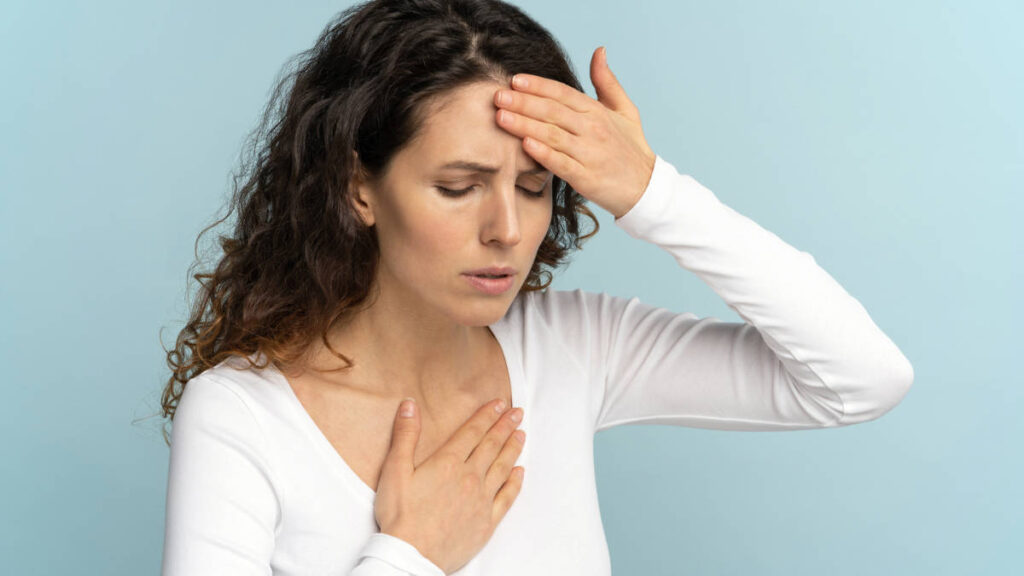Signs of heart attack in women, When it comes to warning signs of heart attack, women often neglect them and sometimes do not even recognize them. This can be dangerous and even deadly. Women should not ignore the twelve signs of a heart attack. Knowing these symptoms and taking immediate action can help save lives. In this blog, we will explore the twelve signs of a heart attack in women that should not be ignored.

We will discuss what to look out for, what to do in the event of a heart attack, and how to reduce your risk of having a heart attack. By the end, you will have a better understanding of the warning signs of a heart attack in women, and how to take action to protect yourself.
Definition of a Heart Attack in Women
A heart attack in women is a serious medical condition that can happen when the heart muscle becomes damaged. The most common cause of a heart attack in women is a blockage in the arteries that supply blood to the heart. Other causes of heart attacks in women include a heart attack caused by high blood pressure, a heart attack caused by a previous heart attack, and a heart attack caused by a tumor.
Overview of the Heart Attack Signs
The most common symptoms of a heart attack are chest pain, shortness of breath, sweating, nausea, and vomiting. Other symptoms may include a sudden feeling of pressure in the chest, an irregular heartbeat, or lightheadedness. If you experience any of these symptoms, seek medical attention immediately.
Signs of Heart Attack in Women
Chest Pain or Discomfort
If you are experiencing chest pain or discomfort, it is important to seek medical attention. Some signs of a heart attack in women include shortness of breath, chest pain, sweating, nausea, vomiting, lightheadedness, or fainting. If you experience any of these signs, it is important to seek medical attention as soon as possible.
Pain or Discomfort in Other Areas of the Upper Body Signs of a Heart Attack in Women
If you are experiencing pain or discomfort in other areas of your body, such as your chest, arm, neck, or jaw, it is important to seek medical attention. Symptoms of a heart attack in women can include shortness of breath, chest pain, lightheadedness, or nausea. If you experience any of these symptoms, it is important to call 911 and seek medical attention as soon as possible.
Shortness of Breath
Shortness of breath is a common symptom of a heart attack, particularly in women. Other signs to be aware of include chest pain, sweating, nausea, and lightheadedness. If you experience any of these symptoms, it is important to seek immediate medical attention.
Nausea or Vomiting
Women are more likely to experience nausea or vomiting signs of a heart attack than men. This is because women are more likely to experience heart attacks due to other factors such as obesity and smoking. Nausea or vomiting can be a sign of a heart attack, but it is not always present. If you are experiencing these symptoms, it is important to see a doctor as soon as possible.
Lightheadedness and/or Dizziness
Women are more likely to experience lightheadedness and/or dizziness following a heart attack, according to a study published in the journal Circulation.
The study, conducted by researchers at the University of Utah, found that women are twice as likely as men to experience these symptoms. The study also found that women are more likely to experience chest pain, shortness of breath, and fatigue following a heart attack.
The study authors say that these findings suggest that women should be especially vigilant for signs of a heart attack and should seek medical attention if they experience lightheadedness or dizziness.
Unusual Fatigue
There are a few unusual symptoms that can indicate a heart attack in women. These symptoms may include extreme fatigue, shortness of breath, chest pain, and lightheadedness. If you experience any of these symptoms, it is important to see a doctor immediately.
Breaking Out in a Cold Sweat
If you experience any of the following symptoms, it is important to seek medical attention immediately: chest pain, shortness of breath, sweating, nausea, lightheadedness, or dizziness. All of these signs could indicate a heart attack in women. If you are experiencing any of these symptoms and have a family history of heart disease, it is even more important to seek medical attention. If you experience any of these symptoms and do not have a family history of heart disease, it is still important to seek medical attention because heart attacks can happen to anyone at any time.
Unusual Anxiety
There are some uncommon signs of a heart attack in women that you should be aware of. These include shortness of breath, chest pain, profuse sweating, and a rapid heart rate. If you experience any of these symptoms, you should seek medical attention immediately. It is important to always be aware of these signs and to take them seriously.
Unusual Palpitations
If you are experiencing unusual palpitations, especially when you are not physically active, it is important to see a doctor. Palpitations are the rapid and irregular beating of your heart. They can be a sign of a heart attack in women. If you experience palpitations that are severe, persistent or come on suddenly, it is important to see a doctor.
Jaw, Neck, or Back Pain
If you are experiencing any of the following symptoms, it is important to seek medical attention: chest pain, shortness of breath, sweating, nausea, lightheadedness, or palpitations. Additionally, if you are a woman and experience any of these symptoms, it is important to rule out a heart attack as the cause. Some of the signs that may indicate a heart attack in women include jaw, neck, or back pain; shortness of breath; sweating; nausea; lightheadedness; or palpitations. If you are experiencing any of these symptoms, it is important to seek medical attention and rule out a heart attack as the cause.
Unusual Heartburn
If you are experiencing any of the following signs and symptoms, it is important to seek medical attention: chest pain, shortness of breath, sweating, nausea, lightheadedness, or vomiting. If you are experiencing any of these signs and symptoms and have a history of heart disease, it is especially important to seek medical attention.
If you are experiencing any of the following signs and symptoms, it is important to seek medical attention: chest pain, shortness of breath, sweating, nausea, lightheadedness, or vomiting. If you are experiencing any of these signs and symptoms and have a history of heart disease, it is especially important to seek medical attention.
Difficulty Sleeping
If you are having trouble sleeping, there are some signs that may indicate you have a heart attack. Difficulty breathing, chest pain, shortness of breath, sweating, and an irregular heartbeat are all common signs of a heart attack in women. If you experience any of these symptoms, it is important to seek medical attention.
Unusual Arm or Shoulder Pain
If you are experiencing unusual arm or shoulder pain, it is important to seek medical attention. This could be an indication of a heart attack in women. Symptoms of a heart attack in women may include chest pain, shortness of breath, fatigue, sweating, nausea, and lightheadedness. If you are experiencing any of these symptoms, it is important to seek medical attention. A heart attack in women can be fatal if not treated quickly.
If you are experiencing unusual arm or shoulder pain, it is important to seek medical attention. This could be a sign of a heart attack in women. Symptoms of a heart attack in women can include chest pain, shortness of breath, sweating, nausea, and lightheadedness. If you are experiencing any of these symptoms, it is important to seek medical attention as soon as possible.
Causes of Heart Attack
There are many potential causes of a heart attack, but the most widespread is atherosclerosis (hardening of the arteries), hypertension (high blood pressure), and cholesterol issues. Other risk factors include smoking, obesity, and diabetes. Taking preventive measures such as a healthy diet, regular exercise, and avoiding smoking can help reduce the risk of a heart attack.
Risk factors of Heart Attack
There are numerous risk factors associated with heart attack, with the most prominent being obesity, high blood pressure, and diabetes. Other factors such as smoking, lack of physical exercise, and a family history of heart disease can also increase the risk of a heart attack. Taking steps to reduce these risk factors can help to reduce the chances of having a heart attack. Also must read the article about how to feel energized and focused.
Genetics factor
A heart attack is a result of a buildup of plaque in the arteries that supply blood to the heart. The plaque can form from the buildup of cholesterol, fatty substances, and other materials in the blood. Genetics may play a role in the development of heart disease. People who have a family history of heart disease are more likely to develop the condition themselves. Other risk factors for heart attack include obesity, high blood pressure, and smoking.
Women’s health conditions
Heart attack is the leading cause of death for women in the United States. Heart disease is the leading cause of death for women in the world. Heart attack is also the leading cause of death for women over the age of 65. Women are more likely to have heart attacks due to several factors, including:
-They are more likely to have risk factors for heart disease, such as high blood pressure, obesity, and smoking.
-They are more likely to have heart disease due to a combination of factors, including gender and genetics.
-They are more likely to die from a heart attack than men.
There are several steps that women can take to reduce their risk of heart attack, including:
-Keeping track of your blood pressure and cholesterol levels.
-Being physically active.
-Reducing your risk factors for heart disease.
-Getting regular checkups.
If you are experiencing symptoms of a heart attack, such as chest pain, shortness of breath, or numbness in your arm or leg, you should call 911 immediately.
Prevention
Prevention of a heart attack is one of the most important things that a person can do. There are many things that a person can do to help prevent a heart attack, but the most important thing is to have a healthy diet and exercise. A healthy diet includes plenty of fruits and vegetables, low-fat and low-calorie foods, and fish. Exercise can be done in many ways, but the most important thing is to get enough exercise. You can also read how to boost vitality in women.
Healthy diet
Many things can increase your risk of heart attack, including smoking, being overweight, and having high blood pressure. To reduce your risk of heart attack, you should try to follow a healthy diet. A healthy diet includes plenty of fruits and vegetables, whole grains, and low-fat foods. You should also limit your intake of saturated fats and cholesterol, and avoid eating too much sugar. If you have heart disease, you should talk with your doctor about a healthy diet plan that is specific to your needs.
Exercise
The American Heart Association (AHA) recommends at least 150 minutes of moderate-intensity aerobic activity per week or 75 minutes of vigorous-intensity aerobic activity. This includes such activities as running, brisk walking, biking, swimming, and elliptical training.
Furthermore, the AHA recommends that adults aged 20 to 39 years who have not exercised regularly for at least six months get at least 30 minutes of moderate-intensity aerobic activity on most days of the week. This includes such activities as running, brisk walking, biking, swimming, and elliptical training.
People with heart disease or a history of heart disease should avoid intense aerobic activity. Here is a guide on how vitality exercise work.
Stress reduction
Stress is a major contributor to heart disease. A recent study found that people who reduce their stress levels by 30% or more can reduce their risk of having a heart attack by 50%. The study also found that people who reduce their stress levels by 50% or more can reduce their risk of death from all causes by 60%.
There are many ways to reduce your stress levels. Some of the most common ways to reduce stress include exercise, meditation, yoga, and prayer. Additionally, you can try to reduce your stress levels by dealing with your problems head-on instead of avoiding them. When you reduce your stress levels, you can improve your overall health and reduce your risk of heart attack, death from all causes, and other health problems.
Medical intervention
There are several things people can do to prevent a heart attack, including eating a healthy diet and getting exercise. However, in some cases, medical intervention is necessary. In particular, people who have a history of heart disease or who are at high risk for heart disease may need to take medications to prevent a heart attack.
Quit Smoking
Quitting smoking can prevent a heart attack by at least 25 percent, according to the Centers for Disease Control and Prevention. Smoking is the leading cause of preventable death in the United States, and it also increases the risk of other health problems, including cancer, stroke, and respiratory disease. If you are thinking about quitting, there are many resources available to help you.
Regular Checkups
Regular checkups are essential for the prevention of heart attacks. By having an annual checkup, any potential problems can be identified early, and preventive measures can be taken to reduce the risk of a heart attack. Early detection and prevention of heart attacks can be life-saving.
Conclusion
In conclusion, it’s important to be aware of the signs of a heart attack in women. While chest pain is the most common symptom, other signs should not be ignored such as pain in the arms, back, jaw, and neck, as well as nausea and shortness of breath. It’s also important to remember that heart attack symptoms in women can vary and may not be as severe as those in men.
If you experience any signs of a heart attack, seek medical attention right away. Early diagnosis and treatment can make a huge difference in reducing the risk of serious complications. If you find these blogs helpful, please share this with your loved ones and friends. You are also welcome to visit our other related blog for more tips and recommendations.


